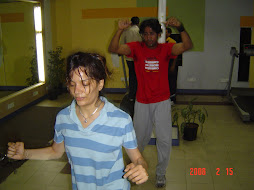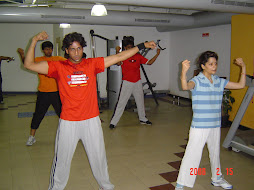Questionnaire:
1.
What are the key benefits of swimming according
to you? Why is it called the best exercise?
Is
the Summer heat making exercising tough! Exercising on land, such as running or
walking, you put a lot of pressure on your joints, bones and muscles. With
swimming, the buoyancy of water acts cushions your body and is no harsh
pounding to stress your joints and muscles, and is a recreational form of
exercise. Besides it is a fantastic way to cool off! That is why it is called
the best exercise!
Perhaps
an injury prevents you from exercising on land and putting any weight on a knee
or ankle. Swimming can help you. Kicking workouts, water aerobics, pool
running, or a regular swimming workout can all give you a great exercise
session without the weight of your body pounding you with each move.
Regular
swimming builds endurance, muscle strength and cardio-vascular fitness. It can
serve as a cross-training element to your regular workouts. Before a dryland
workout, you can use the pool for a warm-up session. Swimming with increasing
effort to gradually increase your heart rate and stimulate your muscle activity
is easily accomplished in the water. After a land workout, swimming a few laps
can help you cool-down, move blood through your muscles to help them recover,
and help you relax as you glide through the water.
While
you do use a lot of calories swimming, once you get out of the pool much of
that calorie burning stops, so swimming is in a way more effective for body
toning than for drastic weight reduction. Doing land based exercise like
running or cycling may use about the same amount of calorie per hour as
swimming, but once you stop exercising the land-based workout usually leads to
continued increase in calorie use for as long as 18 hours after the workout. This
is because when you are in the pool you don't heat up as much as you do on
land, and your body does not have to work to cool you down as much once the
exercise session concludes.
However,
Swimming does exercise almost the entire body - heart, lungs, and muscles -
with very little joint strain. It is great for general fitness, just not a great
way to drop excess pounds and burn on wards of 400 calories! Swimming is a
lifetime sport that benefits the body, mind and spirit. So jump into that pool today!
2.
Which of the following are your favorite strokes:
a.
Freestyle
b.
Breaststroke
c.
Backstroke
d.
Butterfly
e.
Front Crawl
My favorite is swimming the Breaststroke as it gives a
fantastic Core Body workout! The basics are easy to grasp. Breaststroke is
considered short axis stroke. Breaststroke requires the body to move or bend
along the short axis of the body at the hips. During breaststroke, your body
should make a wavelike motion, which is the result of the constant upward and
downward movement of the chest. Because of this bending wavelike movement, your
core body muscles are engaged. Your hips will assist your breathing and
momentum by driving downward and forward. The more breaststroke you swim, the
more you engage your core body, and thus the stronger it will become. The
breaststroke kick also engages the inner and outer thigh muscles that are not
used as often in other strokes. Breaststroke is an overall upper body workout.
This stroke not only strengthens the muscles your upper body but also engages
the forearm, chest and upper back muscles more than any other stroke. The
outward sweeping motion of the hands and inward pull of the water toward the
breast requires use of the deltoids, biceps, triceps, pectorals and trapezius
muscles. The faster you swim breaststroke and the more challenging your swim,
the stronger these muscles will become.
2.
Are there any exercise regimes in the pool that
you recommend?
Yes, there are many exercise routines and
activities one can do in the pool, the most recommended being Bollyfit in
water, Water Aerobics, Water Yoga, Body Toning Workouts in water, Exercises for
Abdominal Muscles in the pool, Working with Weights in the pool, Stretching
& Breathing exercise in the pool, and games like Volley-ball in the pool,
which are high energy, enjoyable as well as they provide a fantastic cardio and
toning workout!
3.
What precautions should one take while swimming?
Swimming is an enjoyable fun activity to do,
but needs to be executed with responsibility, taking the following precautions
at all times:
- Never swim in the pool after drinking alcohol.
- Don’t allow glass bottles or other potential hazards into the pool area.
- Keep radios, CD players, blow dryers, and other electrical devices away from the pool.
- Serious spinal cord injuries, permanent brain damage, and death can occur to swimmers who dive into shallow water or spring upward on the diving board and hit it on the way down.
- Check how deep the water is. Enter the water feet first, especially when going in for the first time.
- Learn how to dive properly by taking classes. Never dive into above-ground pools; they are usually not deep enough. Always check the water depth before plunging into an in-ground pool. Never dive into the shallow end of a pool.
- Wear sunscreen of a good SPF (+30) to protect your self from UV radiation got from strong after noon sun rays
- Keep a first aid kit near the pool in case of emergency. Being prepared for minor injuries can help avoid major ones. Bumps and bruises are a part of childhood. When they are easily treated with bandages, antibiotic ointment and cleaning pads that you have on-hand, the fun can quickly continue.
- Watch out for lightning! Lightning sometimes beats rain. Even if it isn't raining yet, lightning in the distance should be a reason to run for cover away from water. An approaching storm is a sign to get out of the pool.
- Swim where there is a life-gaurd on duty. Develop a buddy system — don't swim alone or allow others to swim alone.
4.
What is the best time to swim and why?
The
best time to swim is early morning, as that is the best time to exercise. In
the mornings, after a good night’s rest, one’s energy is at its peak, giving
you the full benefit of your workout. As the day proceeds, noon time onwards,
the sun rays are most powerful, which exposes the skin to UV radiation, and
some rays will penetrate even if one is wearing sunscreen. If you are swimming
for relaxation, then an evening swim, once the sun isn’t so strong, is also an
option.
Regards,
Reema Sarin
Founder
‘BOLLYFIT’
Actor, Model, Emcee, Bollywood
Dancer & Choreographer






No comments:
Post a Comment